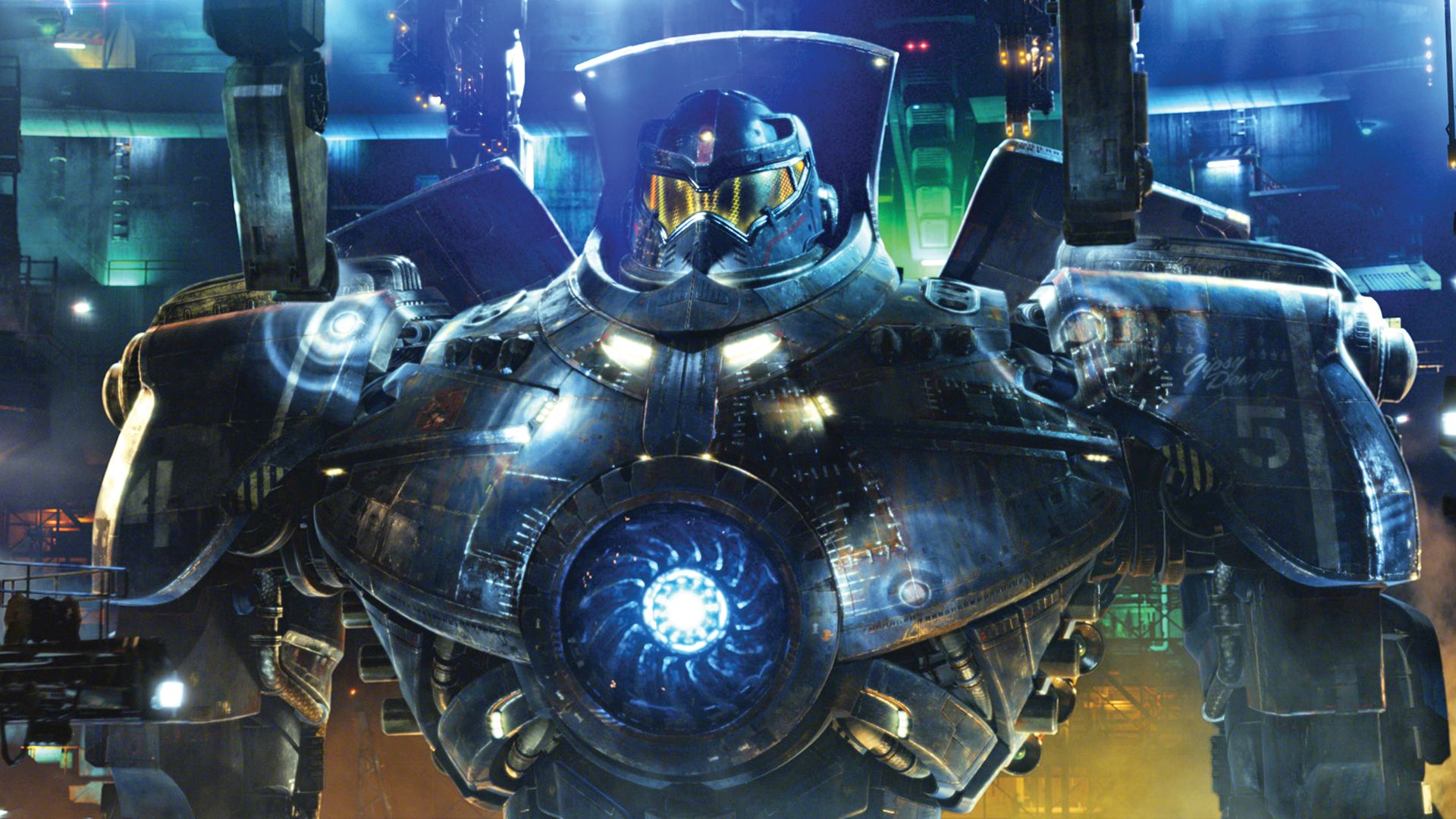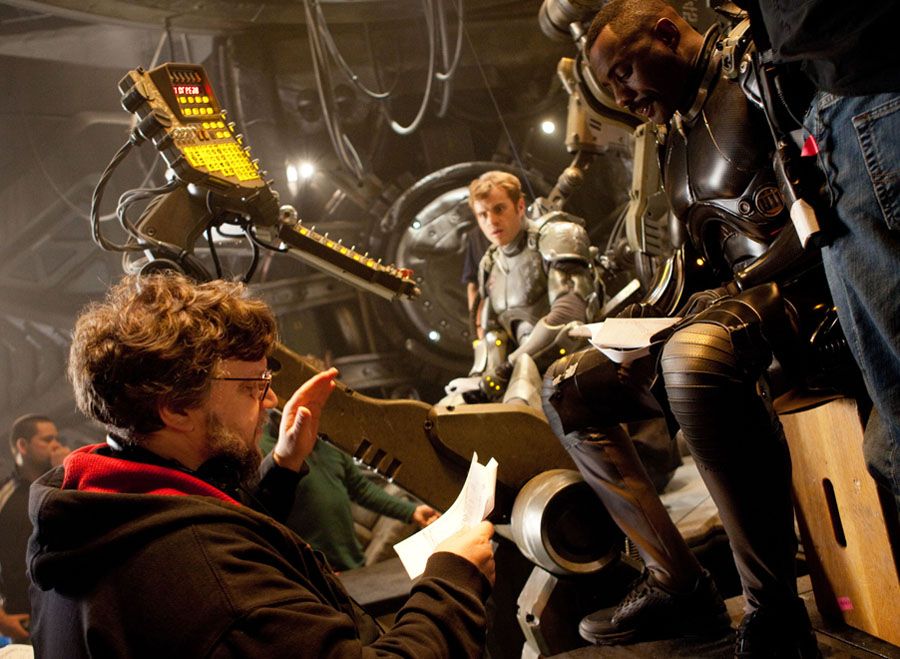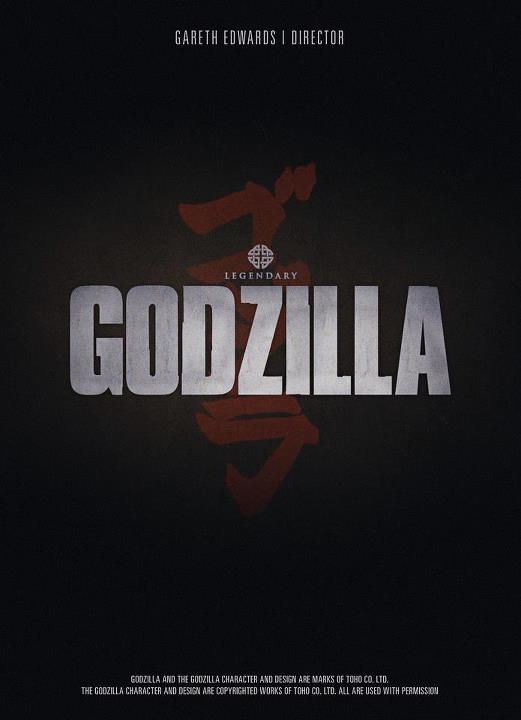At a recent Legendary Entertainment press event in Los Angeles, founder Thomas Tull and Pacific Rim director Guillermo del Toro sat down to discuss the sci-fi epic, the possibility of a sequel and the risks of launching new properties in a crowded summer blockbuster field.
How did Pacific Rim come to find a home at Legendary? What was the development process like from pitch to post?
Thomas Tull: When [screenwriter] Travis Beacham came in and pitched us his idea for a giant-robots-versus-monsters movie, we said yes right away and then rolled up our sleeves and got into the what the story was going to be and how we were going to differentiate that. With the size and the scope and the scale of this, who were we going to go get to be the general of this thing, to be the director? As a fan, one of my favorite directors ever in history is Guillermo del Toro. Sitting down and geeking out with Guillermo and helping to create this world and working on that with him is as cool as it sounds.
Guillermo del Toro: When we started working on the film, it was basically a pitch by Travis Beacham. It was a few pages long. The main thing we wanted to do was make a movie that differentiated itself from anything else visually. We are honoring two genres that are incredibly well-known and loved in Asia: the mecha genre and the Kaiju, an entire slew of pictures that were birthed with Godzilla that became one of the genuine expressions of Japanese culture and its history.
I don't want the movie to look or feel like a typical summer action movie – the full colors, the florescent lights, soldiers kicking ass, basically looking like a car commercial or a recruitment video for the army. I wanted the movie to be visually very crazy. When I talked to everyone when creating and designing this movie, I would repeat the terms “theatrical or graphic” to give a sense of scale. In a movie like this, most of the exercise has to do with scale. It has to be huge!
I grew up with Kaiju movies, so I didn't want to come up with a movie that was brooding and attempting to be a deeper reflection of our human nature whilst creating a dystopian panorama. I just wanted monsters kicking robots' ass and robots fighting and making it an adventure movie. I didn't want to create a war movie, I wanted to create an adventure film. Not only in the design, but the way we created the world. We created a light, airy movie. I wanted it to be under or around two hours. I didn't want to make an epic of dystopian fantasy where you say, "Yeah, the world is pretty fucked up inside and pretty fucked up in here." I wanted very much an escapist movie that posed an incredibly huge menace against us -- not a single country, not a single race, not a single credo -- everyone: Japanese, Australian, Peruvian, Chinese, etc. I wanted the whole world to unite in the face of this madness. We went on to create one of the most insane, unique looking, color-saturated, absolutely vibrant color palettes and textures I've ever known. The monsters of the world are also kickass.
A few people have talked about this summer being filled with an abundance of blockbusters. Do you worry about that with this summer, that there's some self-cannibalizing going on?
Del Toro: It’s fine, I think, as long as we keep distinctly unique personalities to each of the blockbusters. I think it's worrisome when they unify and start blending with each other. Pacific Rim is basically trying to translate two genres from Eastern culture to Western culture. It has an extreme look and extreme position of content, so it's very, very different. I think it would be worse if you start homogenizing and seeing all movies have the same type of action, but summer is traditionally a season in which people go out and seek different paths of entertainment movies.
There's no such thing as a good date anymore. It's crowded in March, it's crowded in September, October, November. You have to go out, do the best you can and present the best entertainment movie you can in the summer and then see what happens.
Are there plans for a Pacific Rim sequel? What would the potential timeline be on it?
Del Toro: We've been talking, Thomas and I, have been talking about ideas for it. We're writing an outline. It goes a very different route than the first one, and there is an excellent Jaeger, which was really, really good because we have an excellent Jaeger in the first one, but we basically couldn't afford it.
Tull: The fans will tell us whether or not [there will be a sequel] -- we had a blast doing this. I've got another story to tell, but ultimately, we'll see how it does.
I would say that if we're fortunate enough that the fans love the first movie, we will look at Guillermo's schedule and also have Travis and Guillermo write it and make sure that it's up to our standards. We certainly wouldn't rush it, but it's a universe that we love being in and we love the movie, so we'll do it as quickly as we can.
Del Toro: You need to, however thoroughly you can, embrace transmedia and you have to think about storytelling on the whole creation, so hopefully no matter how many years pass between the first Pacific Rim and the second one, we will have time to develop a really good video game with a story and universe that continues expanding, that it's a product that continues the story, continue the graphic novels, that will help the mythology of Pacific Rim.
How is Godzilla, which Legendary is currently shooting, a separate experience from something like Pacific Rim?
Tull: Tonally, the films are completely different. You just got a sense for what Guillermo created and the fun that goes along with it and the scale. If you had a chance to see the teaser we did last year, that's more the tone of Godzilla. It's a disaster movie where, "If this really happened, what would you do?" I think tonally, they're very different. We have a mantra at Legendary: You can never have too many giant monster movies.
Del Toro: Frankly, I haven't read [the script for] Godzilla, I didn't want to be direct involved with the process of Godzilla at all. I didn't want it to permeate my mind or vice versa. I know from what I understand of the piece, that [Godzilla director Gareth Edwards] has one area in which to put Godzilla in the real world, so he's going to be reflective about it and it's an exceptional creature in a real environment. We were able to create an alternate universe -- basically a what if? We did it to generate the mythology of the Jaegers, we did it to develop the mythology of the Kaiju. It was a different exercise altogether. It was fun to do and hopefully fun to watch. [Edwards] has the chance of involving it in a different arena, more conceptual, more brooding.
One of the hardest things to do in Hollywood is launch new, original properties during the summer blockbuster season. Most studios shy away from that, instead choosing to adapt material from other media or relaunching old properties. Legendary seems to have less fear in that regard. Where does that come from?
Tull: Foolishness. [Laughs] Here's the thing: In this business either you're a true believer in what you're doing, or you're not. If you play from a place of fear, you won't get anywhere. Consumers are fans and that's what we are first. As a fan, I want to constantly see stories that are engaging and not regurgitated and so forth. 42 is a great example. I can't tell you how many people tried to talk me out of [making that movie]. We just wanted to tell that story. So, for us, the day that it stops working, there's always ditch digging or whatever it is. It's not so much from a place of boldness or anything, it's -- we're in an incredibly fortunate position where we can make stuff that we believe in and work with amazing filmmakers that believe in their stuff and I don't know any other way to do it. Because if you try to chase zeitgeist or try to predict -- "I'm going to give the public exactly what they want" -- I don't think the public, if you went out and conducted a poll, I don't think they knew they wanted Inception until they saw Inception. This is something I love doing and it's a real privilege and we'll keep doing it until they tell us we can't.



